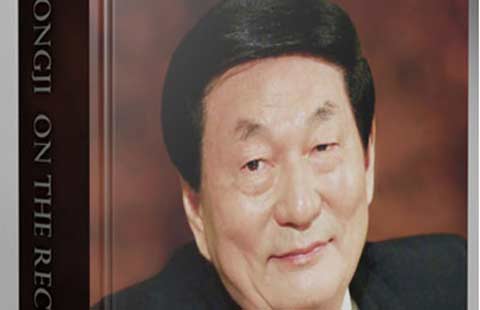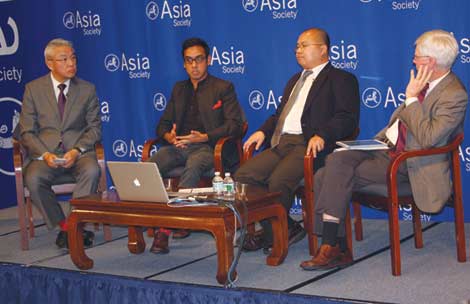China protests against US indictment
Updated: 2014-05-20 08:08
By Chen Weihua in Washington(China Daily USA)
|
||||||||
China reacted strongly on Monday to US announcement of indicting five Chinese military officers for alleged cyber theft.
Foreign Ministry spokesman Qin Gang described the US move as "based on fabricated facts" and "grossly violates the basic norms governing international relations and jeopardizes China-US cooperation and mutual trust".
Qin said China has lodged its protest with the US right after the announcement and has urged the US side to immediately correct its mistake and withdraw the "indictment".
On Monday, the US Justice Department charged five members of the Chinese People's Liberation Army of conducting economic cyber-espionage against US companies. It was the first time that the US has filed such a charge against another nation.
"The range of trade secrets and other sensitive business information stolen in this case is significant and demands an aggressive response," Attorney General Eric Holder told a news conference.
Westinghouse Electric, Alcoa, Allegheny Technologies Inc, United States Steel, the United Steel Workers Union and Solar World are some of the targets of the alleged Chinese hacking.
But the US side did not say whether the alleged Chinese hacking is also for military and national security reasons, a pretext the US has been using all the time to defend its widespread cyber espionage against other nations, as revealed by former National Security Agency contractor Edward Snowden.
Snowden revelation showed that NSA has engaged in widespread hacking activities against not only Chinese government and military entities, but also Chinese companies and universities.
The actual picture of NSA hacking activities is believed to be much larger since only 1 percent of the 58,000 files received by The Guardian from Snowden have been made public, according to the newspaper editor Alan Rusbridger.
In Beijing, spokesman Qin said China has decided to suspend activities of the China-US Cyber Working Group given the lack of sincerity on the part of the US to solve issues related to cyber security through dialogue and cooperation.
The working group was set up last year by the two governments to deal with bilateral cyber security concerns.
"China will react further to the US 'indictment' as the situation evolves," he said, without saying whether China will retaliate by indicting US officials responsible for the rampant NSA hackings against China.
Qin said China is steadfast in upholding cyber security.
"The Chinese government, the Chinese military and their relevant personnel have never engaged or participated in cyber theft of trade secrets. The US accusations against Chinese personnel are purely ungrounded and absurd," he said.
Qin said China is a victim of severe US cyber theft, wiretapping and surveillance activities.
"Large amounts of publicly disclosed information show that relevant US institutions have been conducting cyber intrusion, wiretapping and surveillance activities against Chinese government departments, institutions, companies, universities and individuals," he said.
"China has, on many occasions, made serious representations with the US side. We once again strongly urge the US side to make a clear explanation of what it has done and immediately stop such kind of activities," Qin said.
The latest data from the National Computer Network Emergency Response Technical Team Coordination Center of China showed that from March 19 to May 18, a total of 2,077 Trojan horse networks or botnet servers in the US directly controlled 1.18 million host computers in China, according to a Xinhua News Agency report on Monday.
The center found 135 host computers in the US carrying 563 phishing pages targeting Chinese websites that led to 14,000 phishing operations. In the same period, the center found 2,016 IP addresses in the US had implanted backdoors in 1,754 Chinese websites, involving 57,000 backdoor attacks.
The US attacks, infiltrates and taps Chinese networks belonging to governments, institutions, enterprises, universities and major communication backbone networks, Xinhua quoted a spokesperson from China's State Internet Information Office as saying.
Douglas Paal, vice-president for studies at the Carnegie Endowment for International Peace, said the US decision has the look meant largely for a domestic audience to show that the administration is not as feckless as it looks.
"But actually prosecuting anyone in China is likely to prove feckless as well," he said.
"This leads me to conclude that it is the equivalent of denying visas to Russians close to Putin, which makes it a form of sanction on China for its commercial espionage."
Paal believes the US frustration with China's recent behavior over disputed islands may also lie behind the decision to press charges.
"The administration's effort to address this legitimate issue is hopelessly compromised by the Snowden revelations and I would think it would learn when to cut its losses," he said.
"Giving China an excuse to end the bilateral cyber dialogue is also counterproductive."
Zhu Zhiqun, professor of political science and international relations at Bucknell University, said the latest development exposes one of the biggest problems in the bilateral relationship: deep-rooted suspicion and lack of mutual trust.
"What the US and China can and should do now is to stop finger-pointing and to sit down and map out some mutually-agreed rules or protocol to regulate cyber security," Zhu said.
"Consultation and cooperation will be more helpful and effective than accusation and confrontation."
chenweihua@chinadailyusa.com
- Xinjiang publishes anti-terror brochures
- Security pact sealed with Afghanistan
- President Xi encourages international cultural exchanges
- Premier Li: China willing to help Afghan infrastructure
- Chinese FM: China, Asia-Pacific become community of shared destiny
- Foreign minister remarks on possibility of China-Japan summit
Most Viewed
Editor's Picks

|

|

|

|

|

|
Today's Top News
VW defends safety of recalled New Sagitar
Former premier makes Hurun philanthropists list
Xinjiang publishes anti-terror brochures
SOHO endows $10m to Yale
Cook and Ma talk about partnership
Language a barrier to healthcare for Asian Americans
China businesses need innovation: VC
Security pact sealed with Afghanistan
US Weekly

|

|
















